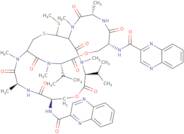Echinomycin
CAS: 512-64-1
Ref. 3D-AAA51264
| 1mg | Discontinued | ||
| 5mg | Discontinued | ||
| 10mg | Discontinued | ||
| 25mg | Discontinued | ||
| 50mg | Discontinued |
Product Information
- Brn 0078671
- Nsc 526417
- Quinomycin A
- S-426-S (Lepetit)
- Sk 302B
- Stereoisomer of N,N'-(2,4,12,15,17,25-hexamethyl-11,24-bis(1-methylethyl)-27-(methylthio)-3,6,10,13,16,19,23,26-octaoxo-9,22-dioxa-28-thia-2,5,12,15,18,25-hexaazabicyclo(12.12.3)nonacosane-7,20-diyl)bis(2-quinoxalinecarboxamide)
- Quinomycin A (9CI)
- N,N'-[2,4,12,15,17,25-hexamethyl-27-(methylsulfanyl)-3,6,10,13,16,19,23,26-octaoxo-11,24-di(propan-2-yl)-9,22-dioxa-28-thia-2,5,12,15,18,25-hexaazabicyclo[12.12.3]nonacosane-7,20-diyl]diquinoxaline-2-carboxamide
- 4-27-00-09726 (Beilstein Handbook Reference)
Echinomycin is a natural product that is used as an antitumor drug. It binds to DNA and inhibits cell proliferation by interfering with polymerase chain reaction (PCR). Echinomycin has been shown to induce apoptosis in tumor cells, which may be due to its ability to bind to the response element of some genes. The binding of echinomycin to DNA induces changes in hydrogen bonding interactions, which may lead to the inhibition of transcription and replication. Echinomycin also has minimal toxicity and low cytotoxicity, making it a promising candidate for cancer therapy.
END>
"Echinomycin is a natural product that is used as an antitumor drug."
"Echinomycin binds to DNA and inhibits cell proliferation by interfering with polymerase chain reaction (PCR)."
"The binding of echinomycin to DNA induces changes in hydrogen bonding interactions, which may lead to the inhibition of transcription and replication."
"Echinomy





